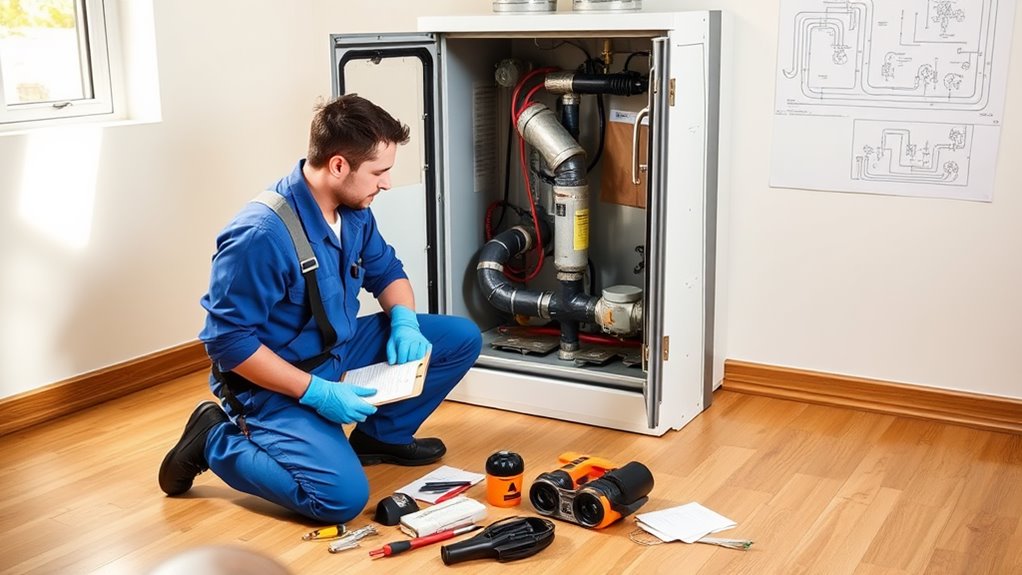Labor costs for boiler installation typically range between £1,000 and £3,000. These costs depend on factors like your location, the complexity of the installation, and the technician’s experience. Urban areas often have higher rates, and seasonal demand can further influence prices. Additionally, proper installation by qualified technicians guarantees safety and compliance with regulations. For more details on types of installations and potential cost-saving tips, you can find valuable information in the following sections.
Key insights
- Average labor costs for boiler installation range from £1,000 to £3,000, depending on installation complexity and technician skill level.
- Installation demand can vary seasonally; costs may rise during colder months when demand increases.
- Geographic location affects labor rates; urban areas typically incur higher installation costs than rural areas.
- Obtaining multiple quotes from qualified technicians is essential for making informed decisions and ensuring fair pricing.
- Additional costs like permits, materials, and disposal fees should also be considered when budgeting for boiler installation.
Factors Influencing Labor Costs
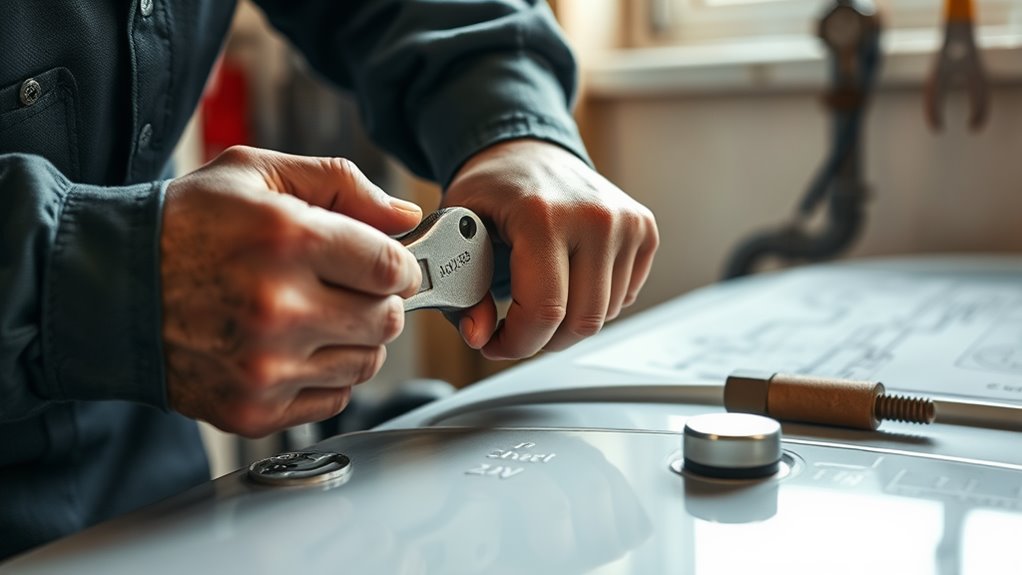
When considering labor costs for boiler installation, several key factors come into play that can greatly impact your overall expense. One primary element is the current labor market; skilled technicians are often in high demand, which can drive up wages. Additionally, installation demand fluctuates based on seasonal trends and economic conditions, further influencing pricing. If there’s a surge in boiler installations due to cold weather or regulatory changes, you may find that labor costs increase as contractors become busier. Geographic location also matters; urban areas typically experience higher rates than rural ones due to competition and cost of living. Understanding these factors will help you better anticipate the labor costs associated with your boiler installation project. Regular servicing ensures safe and efficient operation, which may also influence the labor costs associated with installation and maintenance.
Average Labor Costs for Boiler Installation
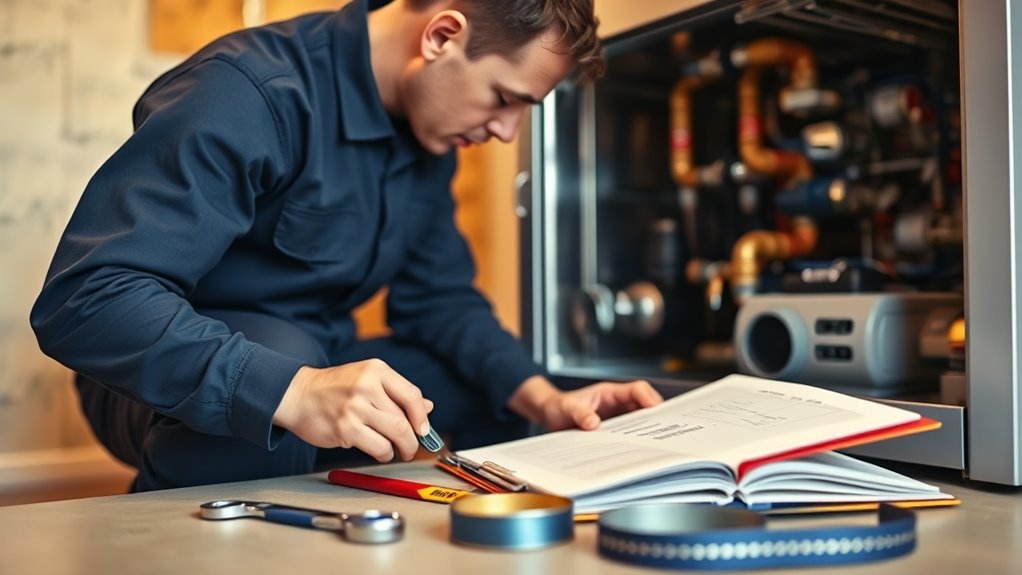
On average, you can expect to pay between £1,000 and £3,000 for labor costs associated with boiler installation, depending on various factors such as the complexity of the job and your location. The skill level of the technician plays an essential role; experienced professionals may charge higher rates but guarantee quality work, including proper boiler maintenance practices. Additionally, installation permits can influence costs, as obtaining them may require additional time and effort. It’s important to factor in these variables when budgeting for your boiler installation. Always get multiple quotes and verify credentials to make sure you’re making an informed decision. Investing in skilled labor can lead to a more efficient and reliable heating system in the long run. Moreover, ensuring compliance with local building regulations is crucial for avoiding fines and ensuring safety.
Regional Variations in Labor Prices
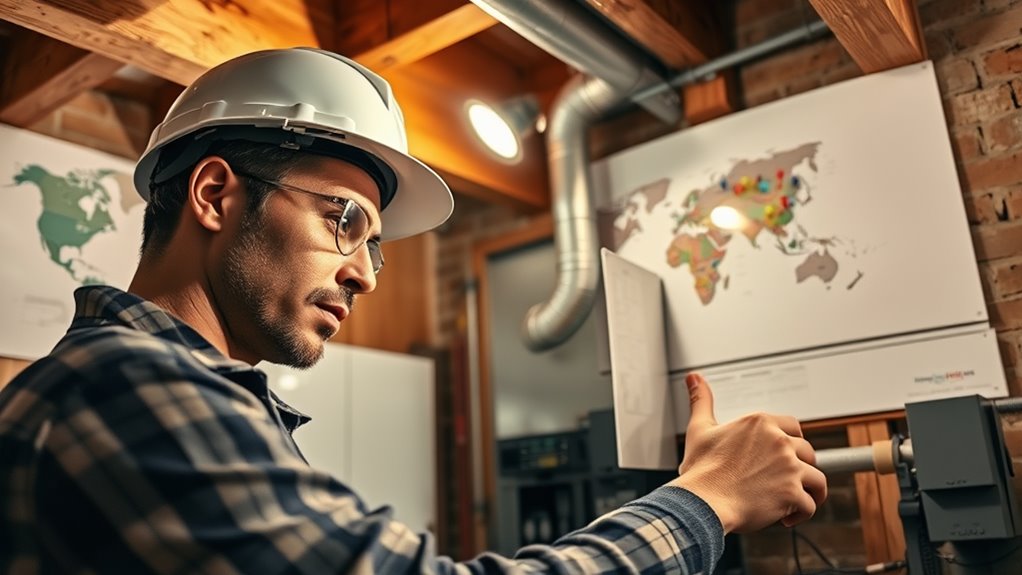
Labor prices for boiler installation can vary considerably based on your geographic location. Understanding regional pricing is essential, as it directly relates to the local labor market. Here are some factors that contribute to these variations:
- Cost of Living: Areas with a higher cost of living typically have higher labor rates.
- Demand for Services: Regions with a booming housing market may see increased demand for boiler installations.
- Availability of Skilled Labor: A shortage of qualified technicians can drive prices up.
- Local Regulations: Different regions may have specific codes that affect installation complexity and costs. Additionally, the need for compliance with safety regulations can influence labor costs, as certified professionals may charge more to meet these standards.
Types of Boiler Installations and Their Complexity
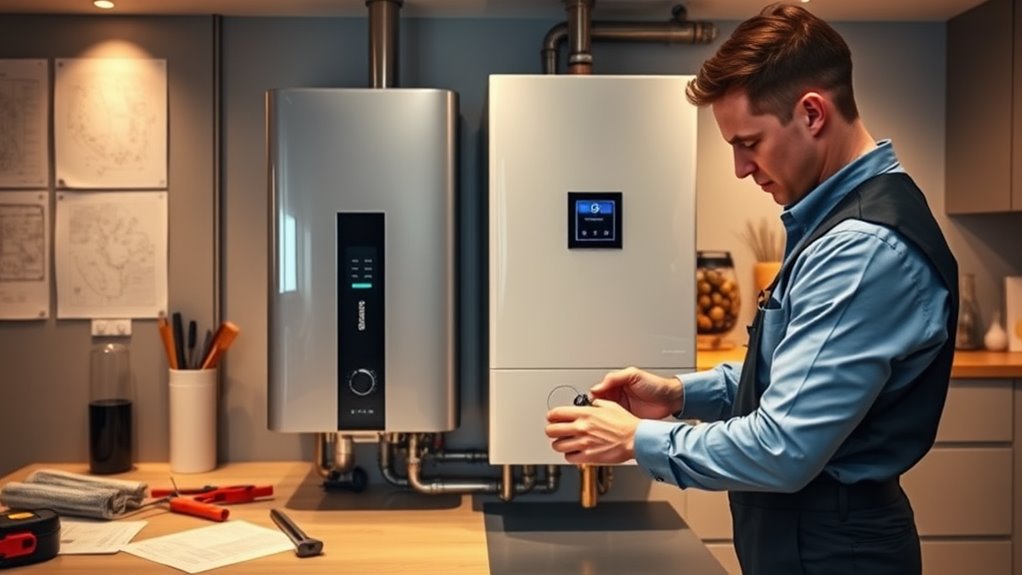
When considering boiler installations, you’ll encounter three main types: conventional, combi, and system boilers. Each type presents varying levels of complexity that can greatly impact the installation process and labor costs. Understanding these differences will help you make an informed decision based on your specific heating needs and budget. Additionally, regular preventative maintenance is essential to ensure the longevity and efficiency of your boiler system post-installation.
Conventional Boiler Installations
While there are various types of boiler installations, conventional systems remain popular due to their reliability and efficiency. When considering conventional boiler types, you’ll find these key features:
- Separate water tank: Conventional systems typically include a hot water cylinder.
- Increased installation time: The installation process can be more complex due to additional components.
- Gas supply requirement: Confirm your home has the necessary gas connections.
- Space considerations: These systems need more space for tanks and pipes.
Understanding these aspects can help you gauge the labour costs involved in the installation process. It’s essential to collaborate with a qualified technician to guarantee compliance with local regulations and peak performance of your new boiler. Regular maintenance and servicing can also prevent common boiler issues that might arise after installation.
Combi Boiler Installations
Combi boiler installations offer a streamlined solution for heating and hot water needs, making them increasingly popular among homeowners. These systems combine a water heater and a central heating boiler into one unit, which enhances combi boiler efficiency by eliminating the need for separate tanks. You’ll benefit from on-demand hot water and reduced energy bills due to their compact design and high energy efficiency ratings.
However, proper combi boiler maintenance is essential to guarantee ideal performance. Regular servicing helps prevent breakdowns and extends the system’s lifespan. Expect to pay for professional installation, as a qualified engineer will make sure everything’s set up correctly, maintaining safety and efficiency. Overall, investing in a combi boiler can greatly improve your home’s heating solution. Additionally, considering energy-efficient heating options like heat pumps can further enhance your energy savings and reduce operational costs.
System Boiler Installations
System boiler installations represent a versatile option for homeowners seeking efficient heating solutions. These systems provide several notable advantages, making them an attractive choice.
- System boiler efficiency: They heat water directly from the system, reducing energy waste.
- Space-saving design: With fewer components than traditional systems, they require less installation space.
- Reliable hot water supply: You’ll enjoy a constant supply of hot water, ideal for larger households.
- Lower maintenance costs: Their integrated components typically lead to reduced servicing needs. Additionally, regular inspections by qualified engineers can help identify issues early, preventing problems such as low water pressure that could affect boiler performance.
Importance of Hiring Qualified Technicians
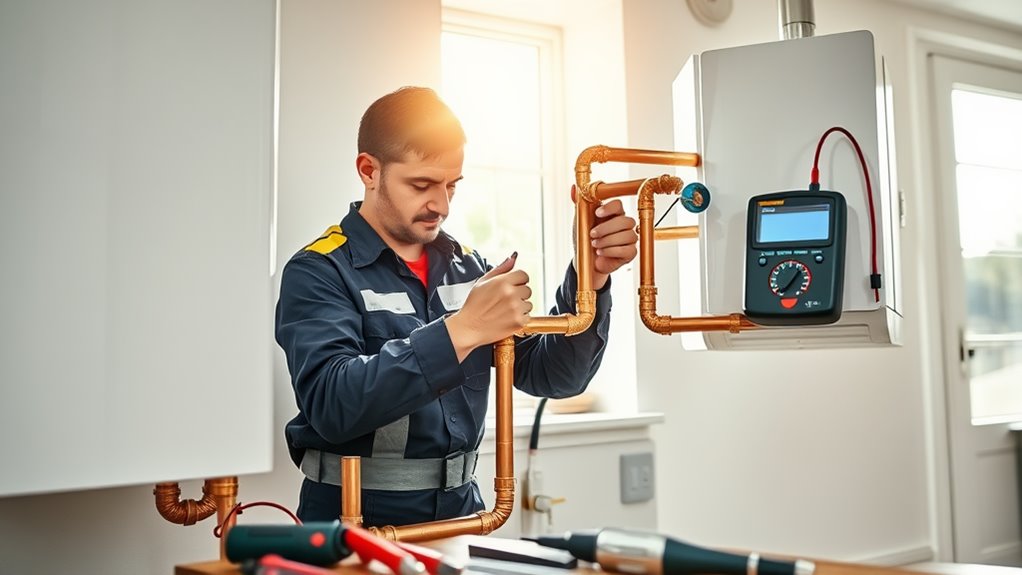
When installing a boiler, hiring qualified technicians guarantees compliance with safety standards, protecting both your home and family. Proper installation by trained professionals also safeguards your warranty, which can save you significant costs in the long run. Choosing expertise over convenience is essential for a reliable and safe heating system. Additionally, obtaining a Commercial Gas Safety Certificate ensures that all gas appliances and systems are regularly monitored for safety compliance.
Safety Compliance Standards
Guaranteeing safety compliance standards is critical for any boiler installation, as improper handling can lead to serious hazards. Hiring qualified technicians assures that all safety regulations are met and compliance checks are performed accurately. Here’s why you should prioritize qualified help:
- Expertise in Safety Regulations: They understand the latest codes and standards.
- Thorough Compliance Checks: They guarantee every aspect of the installation adheres to legal requirements.
- Risk Reduction: Proper installation minimizes the chances of accidents or equipment failure.
- Peace of Mind: Knowing your boiler is installed safely allows you to use it without worry. Additionally, qualified technicians are equipped to handle complex issues related to ignition that can arise during installation, ensuring a smooth operational start-up.
Warranty Protection Assurance
Hiring qualified technicians not only guarantees compliance with safety standards but also plays an essential role in maintaining your warranty protection. Many boiler manufacturers offer various warranty types, including parts and labor coverage, which can have significant implications for your investment. When you hire unqualified personnel, you risk voiding these warranties, as improper installation can lead to malfunctions not covered under warranty duration. Certified technicians understand the specific requirements outlined in your warranty documentation, ensuring that your installation meets all necessary guidelines. This approach safeguards your equipment and gives you peace of mind, knowing that you’re protected against costly repairs. Ultimately, investing in skilled labor is vital for maximizing your boiler’s warranty benefits and longevity. Moreover, common causes of malfunctions, such as improper installation, can lead to errors like the E119 code, emphasizing the need for expertise in the installation process.
Additional Costs to Consider
While you might have a clear idea of the primary costs associated with boiler installation, it is essential to factor in additional expenses that can impact your overall budget. These costs can quickly add up if you’re not prepared. Consider the following:
- Installation permits: Depending on your location, you may need specific permits, which can incur extra fees.
- Additional materials: This includes pipes, fittings, or other components necessary for installation.
- Disposal fees: If you’re replacing an old boiler, disposal costs for the old unit can apply.
- Inspection fees: Some areas require an inspection post-installation, which can also affect your final budget.
Timeframe for Boiler Installation
When planning your boiler installation, understanding the timeframe for the project is just as important as budgeting for costs. The installation duration typically ranges from one to three days, depending on the complexity of the system and your home’s existing infrastructure. Factors like the type of boiler, any necessary upgrades to your plumbing or electrics, and the availability of the installer can impact this timeframe. Scheduling considerations also play a significant role; make certain your chosen dates align with the installer’s availability and any necessary inspections. It’s wise to factor in potential delays due to unforeseen issues, such as old pipe removal or additional fittings. A clear timeline helps guarantee a smooth installation process and minimizes disruptions to your daily routine.
Cost-Saving Tips for Homeowners
Installing a boiler can be a considerable investment, but there are several cost-saving strategies you can employ to ease the financial burden. By focusing on energy efficiency and proper maintenance, you can reduce long-term costs considerably. Here are some tips to take into account:
- Choose a high-efficiency boiler model to lower energy bills.
- Schedule regular maintenance to prevent costly repairs.
- Insulate pipes and ducts to minimize heat loss.
- Explore government grants or rebates for energy-efficient upgrades.
Implementing these maintenance tips not only enhances your boiler’s performance but also extends its lifespan. By taking these steps, you can guarantee your investment pays off in the long run, making your home more comfortable and your wallet happier.
Questions to Ask Your Installer
After you’ve implemented cost-saving strategies, it’s important to guarantee your boiler installation goes smoothly. Start by asking about your installer’s qualifications. Ascertain they’re certified and hold the necessary licenses for your specific boiler type. Inquire about their installation experience—ask how many similar installations they’ve completed and if they can provide references. It’s also wise to discuss the expected timeline for your project and any potential challenges they foresee. Additionally, clarify the warranty on both the boiler and their labor to safeguard your investment. Finally, ask how they handle unexpected issues during installation. These questions help you assess the installer’s competence and readiness, guaranteeing your boiler installation meets both safety standards and your expectations.
Comparing Quotes From Different Contractors
When installing a boiler, obtaining multiple quotes is essential for making an informed decision. Various factors, including materials, labor, and contractor experience, can greatly influence pricing. Evaluating each contractor’s credentials guarantees you choose a qualified professional who meets your needs.
Importance of Multiple Quotes
Obtaining multiple quotes from different contractors is essential for ensuring you receive a fair price and quality service when installing a boiler. This practice not only highlights the importance of transparency in pricing but also allows for better negotiation outcomes. Here are some key benefits of gathering multiple quotes:
- Price Comparison: Evaluate costs to find the most competitive rates.
- Service Quality: Assess the reputation of contractors through reviews and feedback.
- Scope of Work: Understand what each quote includes, ensuring no hidden fees.
- Negotiation Leverage: Use lower quotes as a bargaining tool to secure better terms.
Factors Influencing Pricing
While comparing quotes from different contractors, several factors can greatly influence the pricing of boiler installation. One key element is the current labor market; fluctuations in labor availability can lead to varying costs. Contractors may adjust their prices based on demand for skilled labor, impacting your overall quote. Additionally, the installation techniques employed can affect labor intensity and time required for the job. Some contractors might utilize advanced methods that streamline the process, potentially reducing labor costs. Others may stick to traditional techniques, which could be more labor-intensive and costly. By understanding these factors, you can make a more informed decision when evaluating quotes from multiple contractors, ensuring you get the best value for your boiler installation.
Evaluating Contractor Credentials
Evaluating contractor credentials is essential for guaranteeing you receive quality service at a fair price. Start by comparing quotes from different contractors, but don’t stop there. You need to dig deeper into their qualifications. Consider the following:
- Contractor Reviews: Look for feedback from previous clients to gauge satisfaction.
- Certification Verification: Verify they hold the necessary licenses and certifications for boiler installation.
- Experience: Check how long they’ve been in the industry and their expertise with different boiler systems.
- Insurance: Confirm they have liability insurance to protect against potential damages during installation.
Frequently Asked Questions
What Qualifications Should I Look for in a Boiler Installer?
When you’re looking for a boiler installer, prioritize their qualifications. Ascertain they hold relevant boiler certifications, as this indicates they’ve undergone proper training and adhere to safety standards. Additionally, consider the installer’s experience; those with several years in the field are likely to handle any issues efficiently. Checking reviews or asking for references can also help you gauge their reliability and expertise. Don’t compromise on these factors for a safe installation.
Are There Any Warranties on Labor for Boiler Installations?
Yes, many boiler installation companies offer warranties on labor, providing you peace of mind. These labor guarantees typically cover any issues arising from the installation process for a specific duration. Warranty coverage varies, so it’s essential to ask about the terms before hiring a contractor. Make sure you read the fine print, as some warranties may require regular maintenance to remain valid. Always prioritize installers who stand behind their work with solid guarantees.
Can I Install a Boiler Myself to Save Costs?
You can attempt a DIY boiler installation to save on costs, but it comes with significant risks. Improper installation may lead to safety hazards, inefficiency, or even damage to your home. Local codes often require professional installation to guarantee compliance and safety. Remember, a faulty boiler can result in costly repairs or potential hazards, so weigh the DIY risks carefully before proceeding. Consider consulting a professional for best practices and safety.
How Do I Know if My Boiler Needs Replacement?
To determine if your boiler needs replacement, check its age and performance issues. Most boilers last 10-15 years; if yours is older, it may be time to contemplate a new one. Watch for signs like inconsistent heating, strange noises, or higher energy bills. These performance issues can indicate inefficiency or impending failure. If you notice these problems frequently, it’s wise to consult a professional to assess whether a replacement is necessary.
What Should I Do if My Boiler Installation Goes Wrong?
If your boiler installation goes wrong, prioritize safety first. Shut off the gas and electricity to the boiler to prevent hazards. Then, conduct an installation inspection to identify any faults. Contact a qualified technician immediately for professional assistance. Don’t attempt to fix it yourself, as improper handling can lead to dangerous situations. Document any issues you notice; this information will help the technician address the problem effectively. Safety should always come first.
Summary
In conclusion, understanding labor costs for boiler installation involves considering various factors like regional pricing, installation complexity, and the importance of hiring qualified technicians. By being informed about average costs and asking the right questions, you can make a more educated decision. Remember, comparing quotes from different contractors can lead to significant savings. Ultimately, investing in professional installation guarantees efficiency and longevity for your new boiler, making it worth the cost.

